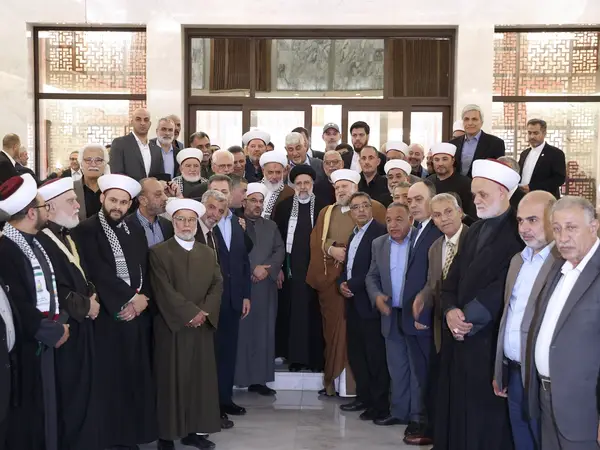Iranian President Ebrahim Raisi Thursday met with anti-Israel groups during his two-day visit to Syria, Tehran's close ally, where he also signed several agreements.
According to reports by the Islamic Republic’s state media, Raisi and his Syrian counterpart Bashar al-Assad signed a “long-term strategic comprehensive cooperation” deal in addition to 14 other agreements in various areas, including trade, oil and energy, engineering, housing, rail and aerial transportation.
Heading a high-ranking politico-economic delegation, Raisi arrived in Damascus on Wednesday. The visit was the first by an Iranian president since the civil war broke out in Syria in 2011.
On the second day of his visit, Raisi held a meeting with representatives of militia groups fighting against Israel from Syria. These groups, which enjoy huge financial and military support from Tehran, are often called the “resistance axis” in the jargon of the Islamic Republic.
Most of these groups have representative offices in Syria.
During the meeting with the leaders and commanders of the militant groups, Raisi reiterated Tehran’s claim about the future of the region, saying that Israel’s elimination may happen very soon as signs of its decline are visible, and described “resistance” as the only way to counter “the occupying regime.”
“The Zionist regime also planned to divide Syria with the support of the United States and Western countries, as well as the fielding of terrorist groups created by the United States, but they did not succeed,” he said.
Raisi stressed the need for unity among these forces in order to expedite “the collapse of Israel, the liberation of the holy al-Quds, and the Palestinians’ sovereignty over their fate.” “Today, the initiative is in the hands of Palestinian fighters on the battlefield, not at negotiating tables. We believe that the demise of the Zionist regime is imminent as the signs of its decline are visible,” he said.
“The only solution for Palestine is state sovereignty based on the will of the Palestinians. If the Westerners seek democracy, they should acknowledge the Palestinian people’s vote and remain committed to it,” Raisi said.
On Wednesday, Raisi addressed a host of Syrian regime loyalists and officials at a Shia shrine, saying, “The policy of the Islamic Republic of Iran is to support the oppressed and hence, it stands beside the oppressed Palestinian nation as well as the resistance in Lebanon, Syria and elsewhere in the world."
Raisi had a large retinue during his visit to Syria asa majority of his cabinet was accompanying him.
Mehrdad Bazrpash, the Iranian road minister and head of the Iran-Syria Joint Economic Commission described the signed documents as “nearly unprecedented both in terms of number and importance of issues.”“A major part of these documents seeks to facilitate trade between the two countries,” he told IRIB after the signing ceremony, noting that the agreements will improve the quality and volume of bilateral trade.
Tehran and Damascus apparently also discussed the establishment of a joint bank and joint insurance company that will ease trade, said the official.
According to one of the agreements, 50,000 Iranians will be able to make pilgrimage to the shrine of Hazrat Zainab, the granddaughter of the Prophet Muhammad, in Damascus on a yearly basis, using three to five direct flights every week, Bazrpash said. He added that the operation to dispatch pilgrims will start in the next two months.
Israel has vowed to prevent Iran's entrenchment in Syria. Israeli strikes in recent weeks have seen key Iranian military figures killed from the Revolutionary Guards and the Quds Force. Israel has been regularly targeting Iranian weapons depots and shipments in Syria.
